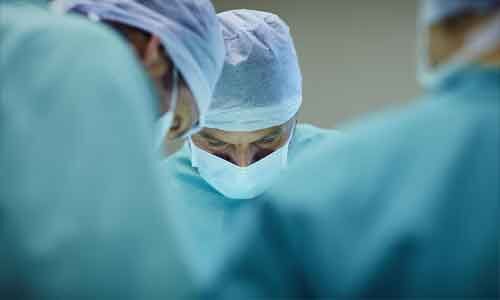- Home
- Medical news & Guidelines
- Anesthesiology
- Cardiology and CTVS
- Critical Care
- Dentistry
- Dermatology
- Diabetes and Endocrinology
- ENT
- Gastroenterology
- Medicine
- Nephrology
- Neurology
- Obstretics-Gynaecology
- Oncology
- Ophthalmology
- Orthopaedics
- Pediatrics-Neonatology
- Psychiatry
- Pulmonology
- Radiology
- Surgery
- Urology
- Laboratory Medicine
- Diet
- Nursing
- Paramedical
- Physiotherapy
- Health news
- Fact Check
- Bone Health Fact Check
- Brain Health Fact Check
- Cancer Related Fact Check
- Child Care Fact Check
- Dental and oral health fact check
- Diabetes and metabolic health fact check
- Diet and Nutrition Fact Check
- Eye and ENT Care Fact Check
- Fitness fact check
- Gut health fact check
- Heart health fact check
- Kidney health fact check
- Medical education fact check
- Men's health fact check
- Respiratory fact check
- Skin and hair care fact check
- Vaccine and Immunization fact check
- Women's health fact check
- AYUSH
- State News
- Andaman and Nicobar Islands
- Andhra Pradesh
- Arunachal Pradesh
- Assam
- Bihar
- Chandigarh
- Chattisgarh
- Dadra and Nagar Haveli
- Daman and Diu
- Delhi
- Goa
- Gujarat
- Haryana
- Himachal Pradesh
- Jammu & Kashmir
- Jharkhand
- Karnataka
- Kerala
- Ladakh
- Lakshadweep
- Madhya Pradesh
- Maharashtra
- Manipur
- Meghalaya
- Mizoram
- Nagaland
- Odisha
- Puducherry
- Punjab
- Rajasthan
- Sikkim
- Tamil Nadu
- Telangana
- Tripura
- Uttar Pradesh
- Uttrakhand
- West Bengal
- Medical Education
- Industry
Scientists develop new laser method for cataract surgery

Cataract is among the most widespread eye diseases. According to WHO, up to a third of all visual impairments have to do with cataract. The treatment methods are well-known but can sometimes be traumatizing. Scientists from ITMO and the S.N. Fyodorov Eye Microsurgery Complex spent over 20 years working on reducing the side effects of cataract surgery.
Russian scientists have come up with a technology where a laser is used both to destroy the clouded eye lens and to stimulate the regeneration of adjacent tissue. The researchers gave a detailed description of their method in an article that has been recently published in Optical and Quantum Electronics.
The eye is a very important organ. A healthy eye lets us see in the light and in the dark, read fine print and trace fast objects. But if something goes wrong, the eyesight can rapidly degrade or even disappear completely. One of the common problems is the clouding of the lens, or cataract. The methods for treating cataract are being constantly improved; for one, scientists from ITMO University work on this topic in collaboration with specialists from the S.N. Fyodorov Eye Microsurgery Complex.
"The treatment method is surgical and has to do with removing the clouded eye lens and replacing it with an artificial one made of plastic or sapphire, comments Andrey Belikov, a professor at ITMO University. "The eye lens is destroyed either with ultrasound or a laser. When using a laser, a special tip is inserted into the anterior chamber of the eye close to the lens, and the laser breaks the lens into tiny fragments that are then removed from the eye. An artificial lens is then put in their place. The problem is that this process damages the adjacent tissue, and the regeneration doesn't always go well."
In the recent decades, many researchers placed their focus on reducing the traumatizing effect of cataract surgery. In 1997, scientists from ITMO University and S.N. Fyodorov Eye Microsurgery Complex, as well as several other research institutions, started to experiment with the use of laser radiation for destroying the cataract. With time, surgeons noticed that the less powerful laser can not only illuminate the surgical field but also stimulate the regeneration of the damaged tissue. So they started conducting experiments aimed at finding the optimal interaction method between the destroying and the illuminating lasers. It turned out that using both lasers simultaneously is the most efficient method. This idea called for elaborate work of optical engineers: as entering the eye with two instruments at the same time is highly undesirable, for the radiation of both lasers it was necessary to use a common optical fiber.
"The simultaneous use of two lasers is good because we get cells that are damaged but not destroyed," comments Prof. Belikov. "And it's very important to stimulate their regeneration at once. This way, the regeneration process takes place in the most favourable conditions."
As of now, the method has already been introduced at the clinic of the S.N. Fyodorov Eye Microsurgery Complex, and almost all of their cataract surgeries make use of two lasers. It has been clinically proved that in the long-term, the use of this method allows to reduce the loss of corneal endothelial cells by 1.8 times in comparison with ultrasonic phacoemulsification, and there have yet been no reports of macular edema or endothelial-epithelial corneal dystrophy.
Hina Zahid Joined Medical Dialogue in 2017 with a passion to work as a Reporter. She coordinates with various national and international journals and association and covers all the stories related to Medical guidelines, Medical Journals, rare medical surgeries as well as all the updates in the medical field. Email: editorial@medicaldialogues.in. Contact no. 011-43720751
Dr Kamal Kant Kohli-MBBS, DTCD- a chest specialist with more than 30 years of practice and a flair for writing clinical articles, Dr Kamal Kant Kohli joined Medical Dialogues as a Chief Editor of Medical News. Besides writing articles, as an editor, he proofreads and verifies all the medical content published on Medical Dialogues including those coming from journals, studies,medical conferences,guidelines etc. Email: drkohli@medicaldialogues.in. Contact no. 011-43720751


